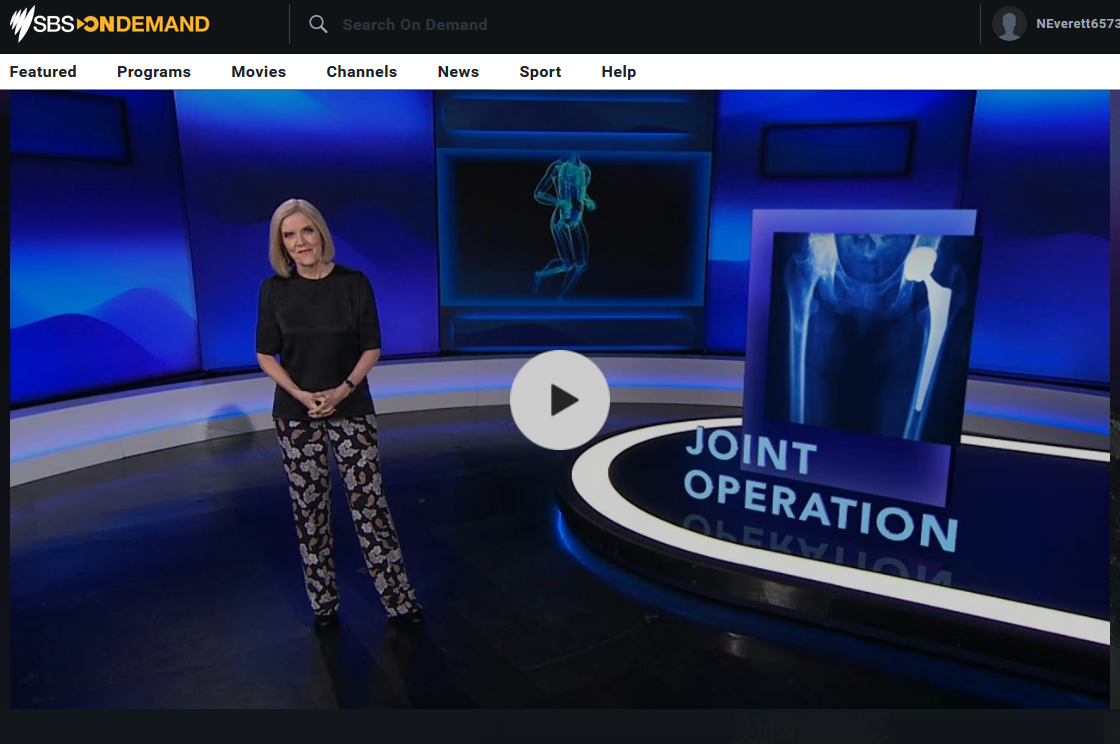Joint Operation - Insight - SBS On Demand
On May 15 2018 the SBS Network in Australia aired an episode of their ‘Insight’ program which highlights the current and ongoing debate amongst health care professionals regarding the effectiveness and appropriateness of surgical and non-surgical alternatives to back, knee and hip surgery. The program features interviews with patients, surgeons, physiotherapists and researchers as they discuss the big question: Is surgery the answer to our joint problems?
The program, available to see here, is an informative and accessible introduction to some complex questions facing those with joint pain and the health professionals caring for then. They suggest that too many patients proceed into surgery without being fully informed about the possible outcomes:
Are there other treatment approaches which should be considered instead of surgery?
What is the risk of complications during and after the operation?
What is the likelihood that surgery will ‘fix’ the joint pain - and is that actually a useful or realistic concept?
What is the expected duration and intensity of pain after the surgery?
What is the expected duration and intensity of rehabilitation required?
For people dealing with severe or persistent joint pain surgery can be a very appealing option, but is it being offered too early, and should it be offered to everyone? Who will actually benefit from a back, knee or hip joint operation?
Some research is now suggesting that many common surgical procedures - including those performed regularly on the back, shoulder and knee - are no better than sham operations. Studies have also shown that high-quality evidence-based conservative (non-surgical) treatment can have outcomes equal to or better than surgery.
An important idea proposed in this video is the need to carefully select which patients should be offered joint surgery. Professor Ian Harris (an orthopaedic surgeon) suggests this decision should be based on the integration of a patient’s symptoms, their functional ability and the severity of their disease shown on medical imaging. Sometimes these factors do not match up, and this is when the decision to offer surgery might be questionable, and may result in unsatisfactory outcomes.
Many issues surround the alternatives that are offered to surgery – including even the use of the word ‘alternative’. This label has become associated with various non-mainstream medical practices including acupuncture, homeopathy, essential oils and electrotherapy. Unlike these ‘alternatives’, the effectiveness of exercise, education, activity modification, pain management and cognitive behavioral therapy for joint pain problems has been well established in numerous clinical trials.
According to its dictionary definition an alternative is ‘another similar option’. But it seems that many people who come out of their meeting with a surgeon without a clear plan for surgery feel that they have been offered a second-best option. Does our system, with its subtle expectations and biases, encourage a belief that non-surgical care is a time-wasting exercise, with surgery the inevitable (and perhaps preferred) end result? In most cases this patient will have been asked to ‘try’ or ‘attempt’ conservative management, and even the use of these words is likely to diminish the perceived efficacy of the treatment.
The experts interviewed suggest that the best management of a patient’s joint pain should involve a team approach, employing the respective expertise of surgeons, physiotherapists, rheumatologists (doctors who specialise in joint disease), pain specialists (doctors who specialise in pain management) and clinical psychologists to help the patient manage the complex issue of ongoing joint related pain.
They encourage people with joint pain to go to a surgeon for answers, and not necessarily to get surgery. Go seeking information about your diagnosis, about what is happening in your body and about all the options available, including the likely risks and benefits of each.
In summary, a good surgeon should be able to advise their patients about both surgical and non-surgical options, including the likely recovery timeframes, likelihood of benefits, and possible risks and complications associated with each option.
https://www.sbs.com.au/ondemand/video/1223465027595/insight-joint-operation

